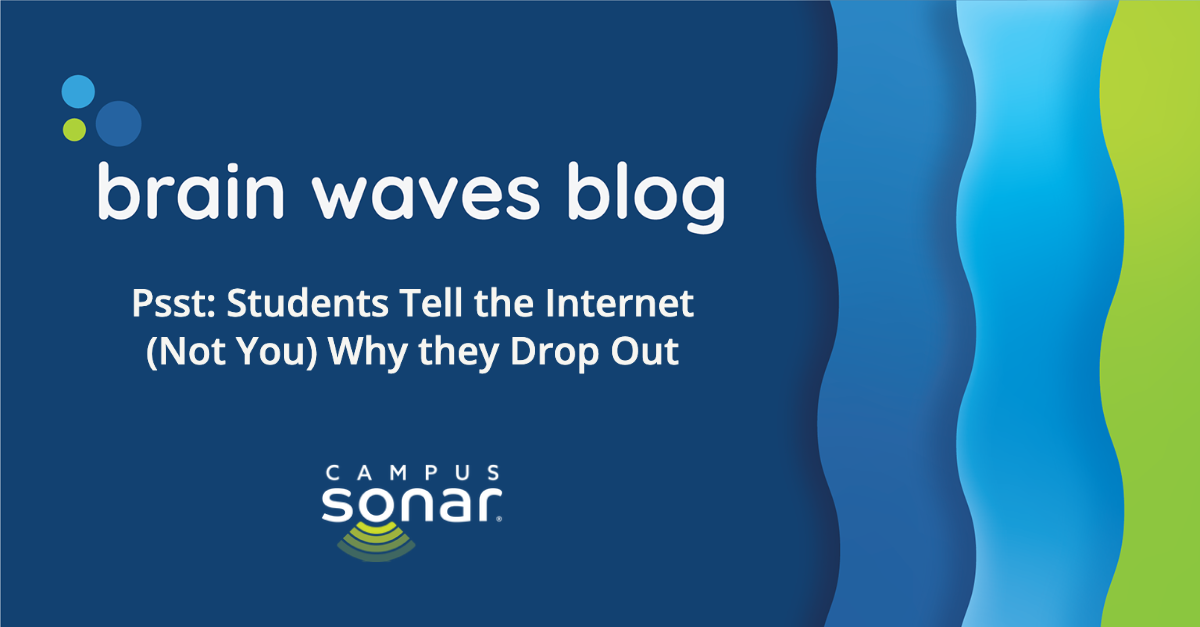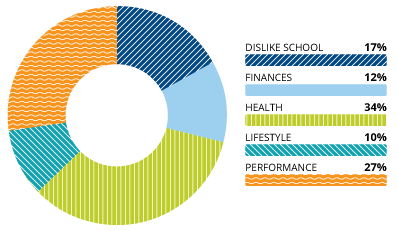Psst: Students tell the internet (not you) why they drop out

Quality data and insights are valuable to higher education marketers. In Are You a Modern Marketer? we maintain that these insights help higher education professionals create data-informed strategies to drive recruitment, growth, and enrollment. But how do higher education professionals find data and leverage the insights accordingly?
The short answer is research—completed by traditional research methods, social audience intelligence, or a combination of both. We've found that social audience intelligence can stand alone or complement traditional audience research. Additionally, social audience intelligence offers unique benefits in comparison to traditional research methods: it's fast, flexible, and human. In fact, we've found insights via social audience intelligence that just aren't possible to learn from traditional methods. Why? Because students are more likely to tell the internet their struggles than a researcher, let alone a campus administrator.
The Research Project
To exemplify this, we recently sponsored a traditional market research project to explore why students drop out of college, and interviewed more than 20 student success professionals. At the same time, I used online conversation research to dive into the same topic and listen to prospective student conversations. Looking at the results side-by-side illustrates the value that social audience intelligence can bring to a research project—and the development of campus strategy.
The Research Objectives
To conduct my social audience intelligence research, I defined my research objectives. These objectives related to student persistence and success, and were twofold: reasons students cited for thinking about dropping out of school and actually dropping out of school. I wrote a query and hypothesized that it would bring in online conversations related to my objectives. I tested and revised it as I gathered preliminary data. Once I was satisfied with the relevance of my conversations, I cleaned my data and ended up with more than 800,000 relevant conversations over a three-year period.
The Results
At this point, I analyzed the data and looked for any patterns or trends. I noticed that students were more likely to discuss dropping out on Twitter and on forums, such as Reddit, and that female students were slightly more likely than males to discuss dropping out online.
After digging into the conversation data, I met my research objectives by identifying five main reasons why a student may drop out of school. The reasons are listed in order of volume of online conversations.
- Health issues. Chronic illness or depression, anxiety, mental health challenges, pregnancy, and stress pose exceptional challenges to students successfully completing their post-secondary education.
- Failure to perform. Whether they failed or were kicked out, some students weren't able to perform academically to stay in school.
- A dislike for school. Students believe that post-secondary education isn't a good fit for them and might dislike or hate the experience.
- Financial challenges. From losing financial aid to the cost of tuition or fees to an unwillingness to take on more debt, students face seemingly insurmountable financial challenges related to their education.
- An unsustainable lifestyle. Students who aren't able to balance academic and social responsibilities often drop out due to excessive partying with, or addiction to, drugs or alcohol.
Identifying these five reasons was exceptionally important to help us better understand why students don't persist, and it was eye-opening to understand the deep inter-relationship between the reasons cited for dropping out. Namely, a student typically doesn't cite just one reason for thinking about leaving, or having left, school. It's more likely that a student drops out due to a combination of the five main reasons.
For example:
- Students' ability to perform academically is tied to their health and financial situation. It appears that students who have health issues often find it hard to perform academically, and these same students typically face financial challenges. Unsurprisingly, some students who face these challenges indicate that they dislike school.
- Ability to perform well is also tied to financial challenges and lifestyle choices. Students who face financial difficulties or live an unsustainable lifestyle while in school are more likely to fail to perform academically.
These may not be earth-shattering insights—campus administrators are likely well aware of the challenges their students face. But I was excited to bring to light the relationship between reasons students cited for dropping out.
Social Intelligence Driven Insights
|
Social audience intelligence delivered two major reasons students cite for dropping out – that traditional methods didn’t uncover. |
While the traditional research project revealed more than a dozen reasons why students leave school (of which my social audience intelligence was consistent), two major reasons that surfaced in my social audience intelligence—alcohol/drug abuse and a strong dislike for school—were absent from the traditional research. This wasn't surprising. How likely is a student to state those two reasons for leaving school when questioned by a campus professional? They're probably even less likely to tell a researcher these reasons, but they don't hesitate to tell Reddit or Twitter.
Why Are these Findings Important?
This is actionable information, not just a fun anecdote for a blog post. It could be used by a student health and wellness office to open up new funding opportunities from grants intended to support retention. It could spur the development of a self-assessment for high school students or a conversation guide for admissions counselors to help students understand what they should expect on a particular campus, and if they may be better off pursuing an alternative education path where they will be happier and more likely to finish. Further analysis on either of these categories would provide additional insights to inform the development of programs and services.
Social Audience Intelligence Amplifies Audience Voice
I've explained how I used social audience intelligence to explore why students drop out of college—and found some interesting reasons that weren't uncovered via traditional research methods. What other questions could social audience intelligence answer for higher education professionals? I see many questions that this type of research could help answer!
- What do working adults think about when they consider going back to school?
- How do our alumni feel about their educational experience?
- What do parents of high school students need during the college search process?
As an analyst, using social audience intelligence research to answer research questions is an impactful way to gain insights into your audience—it removes the potential barriers of traditional research methods and amplifies your audience's unfiltered voice. Are you ready to listen?
Don't want to miss a single post from Campus Sonar? Subscribe to our monthly Brain Waves newsletter to get the latest and greatest about social listening in higher education delivered right to your inbox.
The post Psst: Students Tell the Internet (Now You) Why they Drop Out originally appeared on the Campus Sonar Brain Waves blog.
